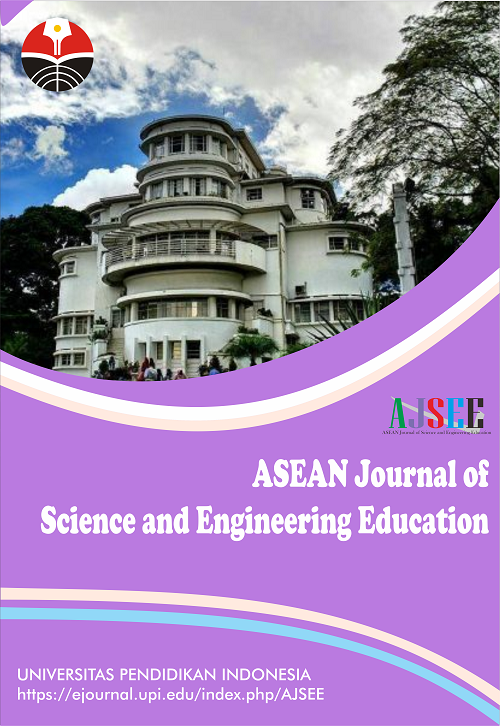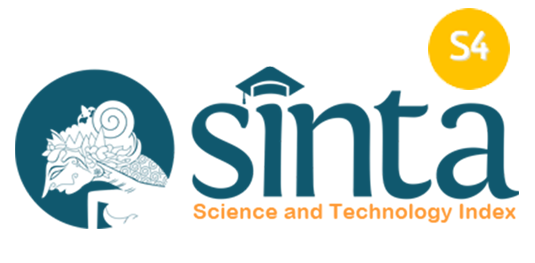How Difficult is 1+1? A Phenomenological Study of High School Students Struggling in Mathematics
Abstract
Keywords
Full Text:
PDFReferences
Ahmad, C. V. (2021). Causes of students’ reluctance to participate in classroom discussions. ASEAN Journal of Science and Engineering Education, 1(1), 47-62.
Alrajeh, T. S., and Shindel, B. W. (2020). Student engagement and math teachers support. Journal on Mathematics Education, 11(2), 167-180.
Amalia, E., Surya, E., and Syahputra, E. (2017). The effectiveness of using problem based learning (PBL) in mathematics problem solving ability for junior high school students. International Journal of Advance Research and Innovative Ideas in Education, 3(2), 3402-3406.
Bottge, B. A., Heinrichs, M., Mehta, Z. D., and Hung, Y. H. (2002). Weighing the benefits of anchored math instruction for students with disabilities in general education classes. The Journal of Special Education, 35(4), 186-200.
Dawson, P., van der Meer, J., Skalicky, J., and Cowley, K. (2014). On the effectiveness of supplemental instruction: A systematic review of supplemental instruction and peer-assisted study sessions literature between 2001 and 2010. Review of Educational Research, 84(4), 609-639.
Hailikari, T., Nevgi, A., and Komulainen, E. (2008). Academic self‐beliefs and prior knowledge as predictors of student achievement in mathematics: A structural model. Educational Psychology, 28(1), 59-71.
Intriago Conforme, D. F., and Melendez, H. V. (2020). The recreational activities and their influence on learning mathematics based students. International Journal of Psychosocial Rehabilitation, 24(2).
Irvine, J. (2020). Positively influencing student engagement and attitude in mathematics through an instructional intervention using reform mathematics principles. Journal of Education and Learning, 9(2), 48-75.
Khiat, K. (2013). Conceptualization of learning satisfaction experienced by non-traditional learners in Singapore. Educational Research Ejournal, 2, 92-106.
Lee, Y., Capraro, R. M., and Capraro, M. M. (2018). Mathematics teachers’ subject matter knowledge and pedagogical content knowledge in problem posing. International Electronic Journal of Mathematics Education, 13(2), 75-90.
Maryanti, R., Nandiyanto, A. B. D., Hufad, A., & Sunardi, S. (2021) Science education for students with special needs in Indonesia: From Definition, Systematic Review, Education System, to Curriculum. Indonesian Journal of Community and Special Needs Education, 1(1), 1-8.
Mohamad, M. A., Putra, Z. A., Bilad, M. R., Nordin, N. A. H. M., & Wirzal, M. D. H. (2021) An excel based tool development for scheduling optimization. ASEAN Journal of Science and Engineering Education, 1(1), 7-14.
Mulwa, E. C. (2015). Difficulties encountered by students in the learning and usage of mathematical terminology: A Critical Literature Review. Journal of Education and Practice, 6(13), 27-37.
Stankov, L., and Lee, J. (2017). Self-beliefs: Strong correlates of mathematics achievement and intelligence. Intelligence, 61, 11-16.
Stigmar, M. (2016). Peer-to-peer teaching in higher education: A critical literature review. Mentoring and Tutoring: partnership in learning, 24(2), 124-136.
Suroto, S., & Nurdin, N. Economic analysis: Solar panels application of NFT (Nutrient Film Technique) hydroponic system in Bandung. ASEAN Journal of Science and Engineering Education, 1(1), 21-30.
Surya, E., and Putri, F. A. (2017). Improving mathematical problem-solving ability and self-confidence of high school students through contextual learning model. Journal on Mathematics Education, 8(1), 85-94.
Tambychik, T., and Meerah, T. S. M. (2010). Students’ difficulties in mathematics problem-solving: What do they say?. Procedia-Social and Behavioral Sciences, 8, 142-151.
Zhou, D., Du, X., Hau, K. T., Luo, H., Feng, P., and Liu, J. (2020). Teacher-student relationship and mathematical problem-solving ability: mediating roles of self-efficacy and mathematical anxiety. Educational Psychology, 40(4), 473-489.
DOI: https://doi.org/10.17509/ajsee.v1i2.33403
Refbacks
- There are currently no refbacks.
Copyright (c) 1970 Universitas Pendidikan Indonesia

This work is licensed under a Creative Commons Attribution-ShareAlike 4.0 International License.














